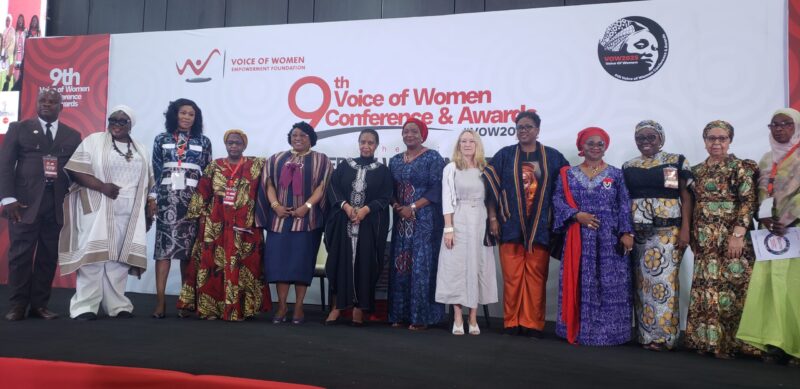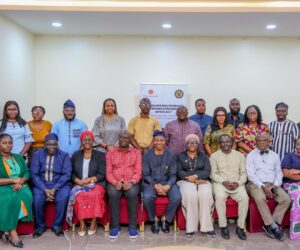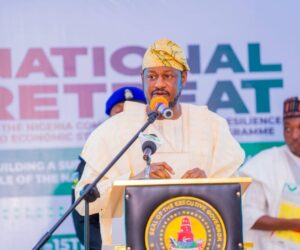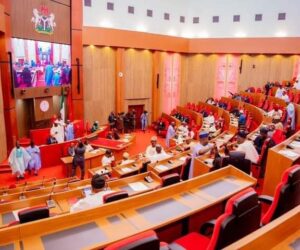Women leaders and gender inclusion advocates have warned that Nigeria risks sliding backwards on gender equality unless urgent steps are taken to expand women’s participation in governance.
The call was made at the 9th edition of the Voice of Women (VOW) Conference and Awards, in Abuja on Thursday. The 2025 edition is themed “Nigerian Women and the Power of Collective Action.”
The annual conference, convened by Women Radio, brought together government officials, development partners, traditional leaders, civil society groups and grassroots women from across the country to push for women’s political inclusion ahead of the 2027 elections.
‘We may take 10 steps back’
Speaking at the event, the co-founder of the Amandla Institute for Policy and Leadership Advancement, Erelu Bisi Adeleye-Fayemi, said the country is in danger of losing hard-won progress if leaders fail to act.
Mrs Adeleye-Fayemi also noted that the Reserved Seats Bill before the National Assembly is an urgent priority.
“That bill is an absolute necessity. Without it, Nigeria will remain stuck at 3.5 per cent women’s representation, which is embarrassing compared to other African countries,” she said.
“We, however, seem to be at a point now where if care is not taken, instead of taking 10 steps forward, we’ll be taking 10 steps back.”
She added that political will from the highest levels of government must be intentional.
“It is one thing to say we want a better world. It is one thing to be intentional. But if there is no political will from the President, the Vice President, and the leadership of the National Assembly, then all our aspirations will remain only on paper,” she said.
Tinubu, Shettima pledge support
President Bola Tinubu, represented by the Minister of Women Affairs and Social Development, Imaam Sulaiman-Ibrahim, said his administration remainsx committed to empowering women under the Renewed Hope Agenda.
“Our ever supportive and resilient Nigerian women, your voices remain the heartbeat of our country; echoing, undaunted, unyielding, and rising to shape a future of equity and progress,” Mr Tinubu said in his message.
The Vice President, Kashim Shettima, also represented at the event by Ms Sulaiman-Ibrahim, praised Nigerian women as the backbone of the country’s resilience and assured that government policies would continue to unlock their potential as drivers of the economy.
Collective action, not half measures
In her keynote address, the Minister of Women Affairs, Ms Sulaiman-Ibrahim, said Nigeria is lagging behind global and regional peers in female political representation.
She noted that currently, women occupy less than five per cent of seats in the National Assembly, far below the African Union target of 50 per cent and beneath the global average of 26.5 per cent.
She argued that the Reserved Seats Bill was not “an act of benevolence but one of justice and strategic necessity” adding that quotas had been the only proven way to raise women’s representation globally.
“By granting spaces for women in governance, we align with global best practices, ensure a more inclusive democracy, and unlock the full potential of half of the Nigerian population currently left behind,” she said.

Women solidarity across parties
Former UN Under-Secretary-General and Executive Director of UN Women, Phumzile Mlambo-Ngcuka, challenged Nigerian women to rise above party lines and form a united political front.
Mrs Mlambo-Ngcuka stressed that without solidarity, women would continue to be fragmented and sidelined in governance.
“The hard truth is this – women cannot afford to be divided along political, ethnic, or religious lines. When women stand together, they change history. When they are divided, others write history for them, “ she said.
She warned that partisan loyalty often weakens women’s collective power, as grassroots and elite women frequently speak in different voices. They also know you are not united.”
According to her, solidarity across political divides is the key to electing more women into office and retaining them.
She urged Nigerian women leaders to “speak the same language as grassroots women, understand their struggles, and build alliances that can stand the test of elections.”
She cited examples from South Africa and Rwanda, where women deliberately worked across political aisles to secure gender quotas and push for laws that transformed representation.
“Those gains did not come because women waited to be given space. They came because women decided to back one another, regardless of political party.”
She however, urged Nigerian women to move from rhetoric to coordinated strategies x
READ ALSO: When Women Keep Watch: Inside Plateau’s women-led vigilantes, peace networks
Recognition of women’s empowerment champions
Another highlight of the event was the presentation of awards to individuals and organisations for their contributions to advancing gender equality and supporting women’s development.
The Women at Risk International Foundation (WARIF) clinched the award for CSO/NGO/CBO supporting women and their families, while Flour Mills of Nigeria won the Family-Focused Organisation Award.
In the corporate category, Guinness Nigeria Plc emerged winner of the Gender Balance Empowering Company Award, and the Kaduna Public Procurement Agency received the Government Agency Supporting Women Award.
For innovation, Meyiwa Vera was honoured in the Social Media Innovation category, while the Lifetime Achievement Award went to Bashir Adewale Adeniyi.
The prestigious VOW Woman of the Year Award was presented to Dame Esther Udiehi, while a Posthumous Award was conferred on the late women’s rights icon, Funmilayo Ransome-Kuti.









